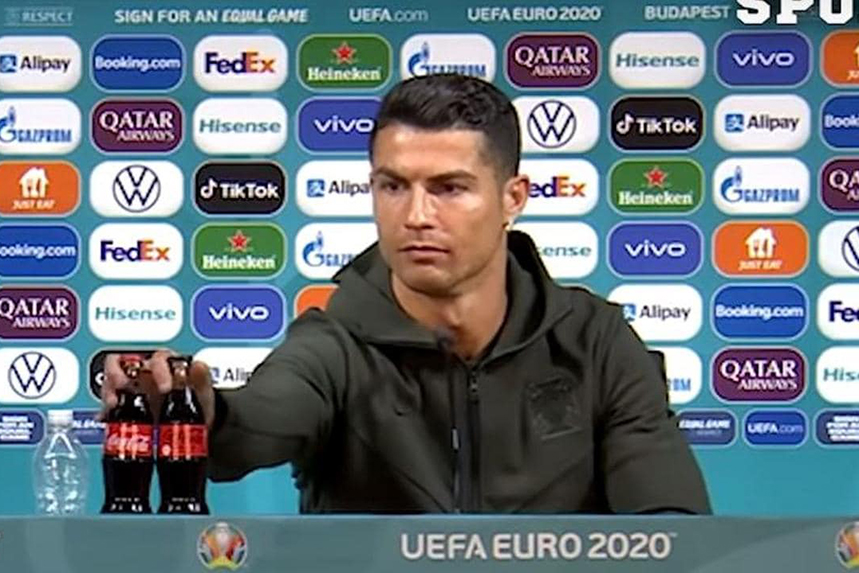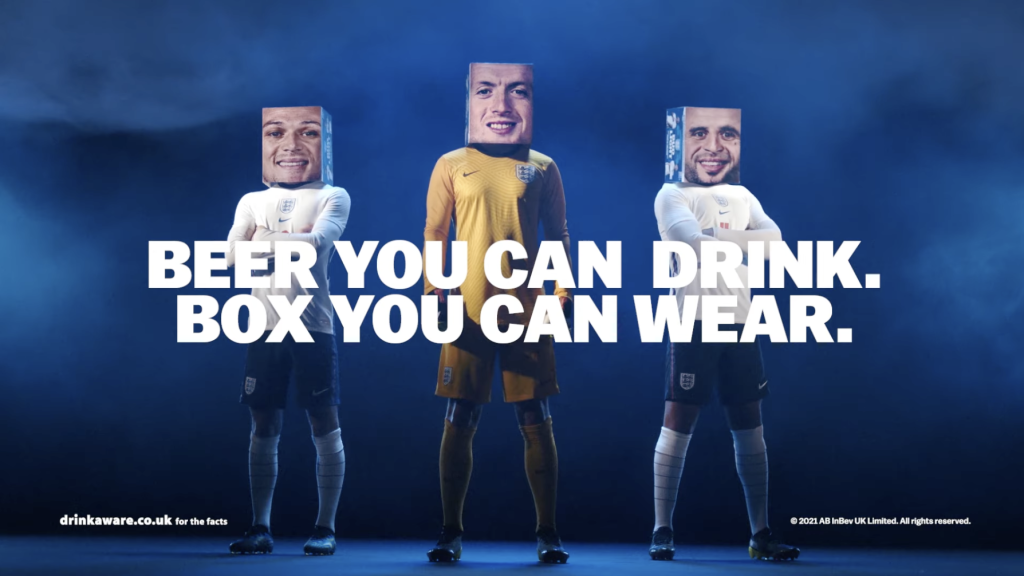What is time?
And this question isn’t an opening to a philosophical debate, truly. It’s more so a commentary on the passage of time – even, maybe especially so, in the world of PR. In order to write this piece, I had to go back and review this whole year. And when I had to double-check that the Voltswagen April Fool’s thing did in fact happen in the year 2021, it made me pause. There’s just a surplus of…everything…happening in the world in general, let alone in the world of brands and the many (mis)steps they took to handle the everything.
It’s easy to misplace events because they come and go, ebb and flow. One crisis is replaced by another, one win by another. Some leave more lasting impressions, some are left in the dust, forgotten.
Only to be dusted off in time for year reviews.
Well, let’s well and truly dust them off, bring them back, and learn a few lessons for the upcoming year.
Remember when…
…Ronaldo snubbed Coca-Cola
If you forgot, here’s a reminder. During the European Championship press conference, Cristiano Ronaldo moved two bottles of Coca-Cola placed in front of him, and instead grabbed a bottle of water while saying “agua” (Portuguese for water).

Cue the gasp. And all-around mayhem.
The story gained so much traction so quickly, it was inevitable some facts were a little embellished.
As it was, Coca-Cola’s shares dropped around that time, and the drop was automatically attributed to Ronaldo’s move. Never mind the fact that the shares were already dropping before the press conference in question, but after the whole event had transpired, Coca-Cola’s share price actually increased by 30 cents, adding to its value.
So, what then?
No interpretation of the events at the time has been entirely right, and there was a little bit of truth to everything. Contradictory, but there seems to be no true answer to these types of situations.
Coca-cola certainly hasn’t suffered in the long term, even if its brand image may have taken a light hit at the time.
Being snubbed by a major sports influencer, with half a billion followers on all of his social media combined, will leave a mark, however insignificant. Especially with the younger, more impressionable audience that hasn’t yet formed strong brand relationships or bonds.
Not only that, but it seems that Ronaldo’s move opened the doors for other athletes to act in the same manner. Case in point, when just a day later another footballer Paul Pogba, a practicing Muslim, removed a bottle of a non-alcoholic 0.0 Heineken. And that actually wasn’t the first time Pogba was boycotting a sponsor. He was part of a group of Manchester United players who three years ago boycotted an entire sponsorship event in lieu of protesting poor travel arrangements.
And the thing is, some of this “bold” behavior is due to personal brands. As a PR expert Mark Borkowski said for The Guardian about Ronaldo:
“Ronaldo is right at the top of social media earners. It is about the rise of the personal brand, the personal channel, it gives so much bloody power. That’s what has allowed Ronaldo to make a point [about a healthy lifestyle].”
Ever since the rise and takeover of social media, public personas have gained a lot more freedom – and power. For the first time these people, the athletes, the celebrities have a direct way of addressing the public and their fans themselves and somewhat controlling the narrative of their stories.
Not to mention the power their legions of followers hold, too – considering their sheer, overwhelming number.
However, that’s not all that’s at play. It’s definitely a helping hand, knowing you have the platform and the privilege of acting on your beliefs without greater repercussions for yourself.
But, it’s also about athlete activism. Ronaldo snubbing Coca-Cola might just be a symptom of a bigger movement at hand.
While his move could have been construed as advocacy for a physically healthier lifestyle, there are athletes, like tennis player Naomi Osaka, who’ve been speaking out about often neglected topics in the sports – like mental health. She was fined and threatened with expulsion for saying she would skip her contractual media obligations due to their effect on her mental health. Because of this, Naomi took to Twitter to explain her bouts of depression and anxiety and garnered much support and praise for speaking out.
These athletes are using their platforms and influence to openly discuss issues they consider important.
Now, whether their stand feels genuine or not is another matter. Ronaldo has been accused of hypocrisy and fake authenticity for so obviously snubbing Coca-Cola, when he himself has not only been in their past ads but also in an ad for KFC, for instance.
What can we learn from all this, though?
Lessons
Even though these events are heavily sports industry-related, they have larger implications. There are two main lessons to be learned:
- Credibility and relevance matter.
There’s an ongoing debate of whether brands of the fast food, high sugar variety like Coca-Cola or McDonald’s should even sponsor sports events. And it boils down to relevancy. A fast-food giant sponsoring an athletic event? That’s a very contradictory, side-eye-inducing relationship. And again, this goes beyond the sports industry.
Every brand should carefully research and plan its brand partnerships and/or celebrity endorsements. You have to know both sides share the same values. Even beyond that, it’s important they have a reputation or a brand image built around those values. You have to know they’re a right fit for your brand and will carry enough credibility for your customer base. The most basic of examples would be an actual vegan promoting vegan products. It comes across as more genuine and believable if the celebrity or an influencer aligns with your brand values.
- Activism bolstered by social media is here to stay.
We’ve mentioned the rising power imbalance between brands and their partners – be it celebrities, athletes, or other influencers. Social media means they now have a platform of their own they can use to directly address and influence the public. Not only that, but it also means they can spark conversations around important issues. It’s made them a much bigger presence and actual role models to many, earning them the privilege of speaking out against what they consider injustices and knowing they’ll have support from their followers.
Knowing the power, influence, and platform they have, they’re able to push back against the status quo.
…IKEA and Bud Light hopped on the Euro 2020 bandwagon
Keeping with the sports theme, both IKEA and Bud Light have used the hype surrounding the championship for a bit of a good PR.
Unlike the drama Coca-Cola had to endure, these two brands used the opportunity of a popular sporting event for relatable, fun content and campaigns.
Back in May, Bud Light created a whole new collection of Boxheads. These were just simple cardboard boxes with faces of the England players with a tagline that read: “Beer you can drink. Box you can wear.”

Fast forward two months later, and IKEA joined in on the fun in its own unique way. “It’s coming home” could be heard everywhere back then, as a beacon of hope for England winning the cup (spoiler alert: they didn’t win). Many brands, including IKEA used the tagline in their game related campaigns.
IKEA unveiled a new cup as part of their dishware section, aptly named KØMMÖNENGLAND (it’s coming home), with a priceless price tag. Needless to say, it captured the attention of the public on social media and picked up on interactions.
Lesson
- Create opportunities out of current events.
While neither IKEA nor Bud Light (nor many of the other brands) are directly associated with the sport or the championship, both saw an opportunity in the chatter surrounding the whole event.
Picture riding the tailcoats of the next big, trending thing. It’s nothing new for brands. However, if executed smartly and in a way that fits your brand voice, it puts you on the map. It can raise your brand awareness and engage your audience.
…Peloton recalled its treadmills after death reports
This at-home gym equipment company was faced with a crisis after several reported incidents, including broken bones, cuts and bruises, were related to its Tread+ machines.
After the death of a young child, who, BBC reported “was found to have tread marks on his back matching the slats of the treadmill”, Peloton only issued a statement warning the parents to keep the children and pets away from the equipment. At the time, Peloton CEO John Foley dismissed the incidents as a “small handful” of “tragic accidents”.
Only a couple of months later did the Peloton recall the machines, admitting their mistake in not doing so sooner. As BBC reported, Foley has said:
“I want to be clear, Peloton made a mistake in our initial response to the Consumer Product Safety Commission’s request that we recall the Tread+,” Mr. Foley said in a statement on Wednesday. “We should have engaged more productively with them from the outset. For that, I apologize.”
Lessons:
- Always and forever – transparency and ownership matter.
Considering the number and severity of reported injuries and the fatal accident, the recall should have been an obvious and immediate move. Peloton should have been more proactive in ensuring the safety of their customers, and less dismissive of the gravity of the situation.
- Build trust – even, especially, in the time of crisis.
Proving your customers you care about their safety is a number one priority in situations like these. Ensuring that the reported incidents don’t happen again is an absolute given in retaining the trust of your customers. And the only way for that to happen is to immediately halt sales and recall harmful products on your own. That way an investigation can take place to discover the cause and stop the issues from happening again.
What can we expect in 2022?
Some two years ago now, the world turned upside down and it hasn’t quite turned back up again. From coronavirus to social issues, brands have had to reevaluate how they do business. More importantly for PR, they’ve had to adjust their communications strategy.
Being able to quickly adapt to new situations, while remaining empathetic and genuine remains a challenge.
If you can take anything from the lessons we went through, it’s this: authenticity, transparency and adaptability. Repeat it, and then repeat it again.
These were important in 2021 and will remain equally as important in 2022, but also in the years to come.